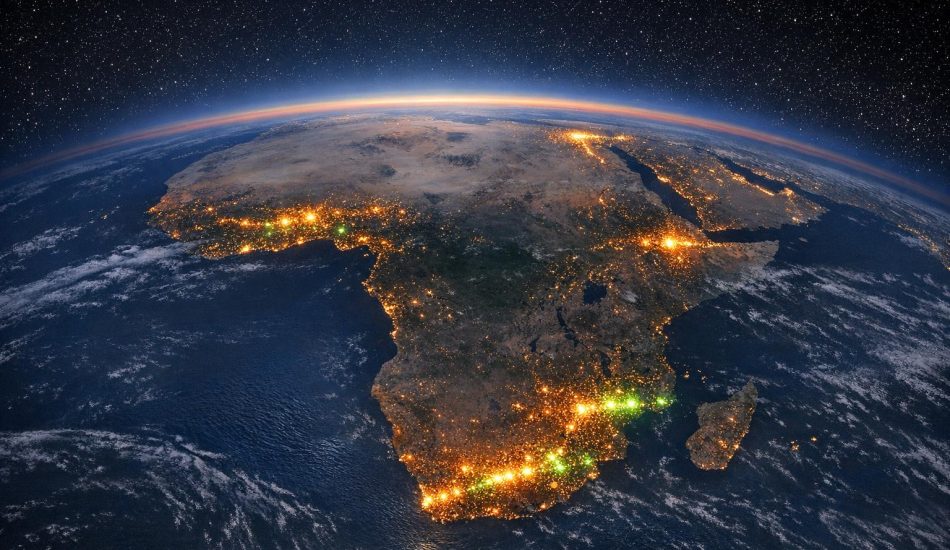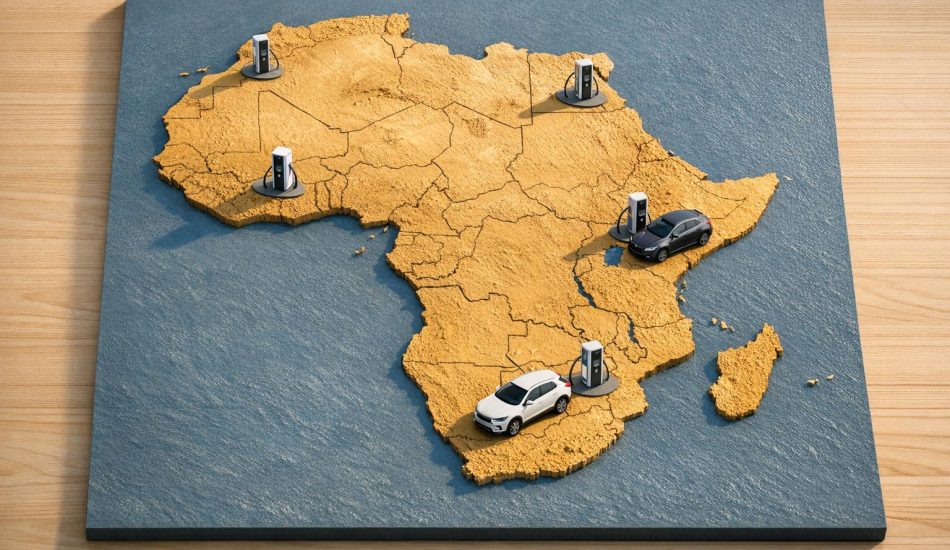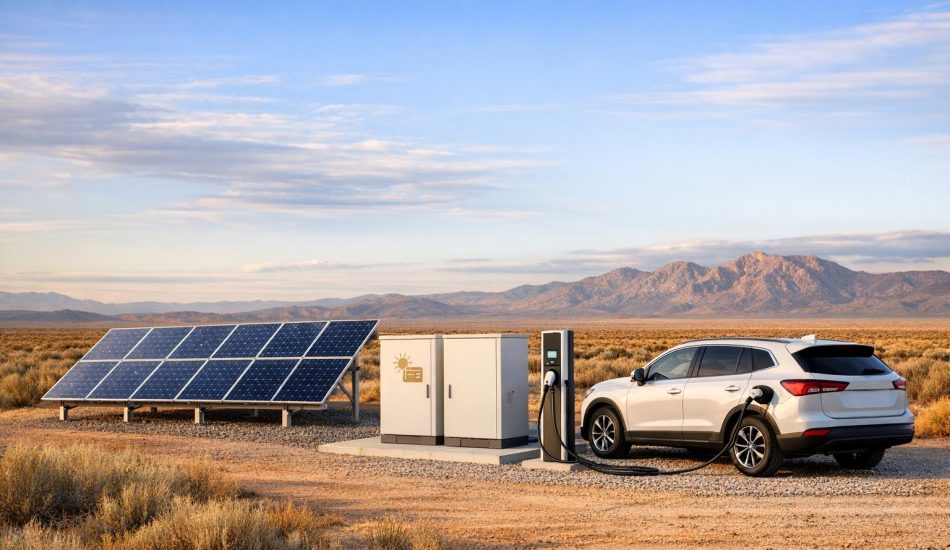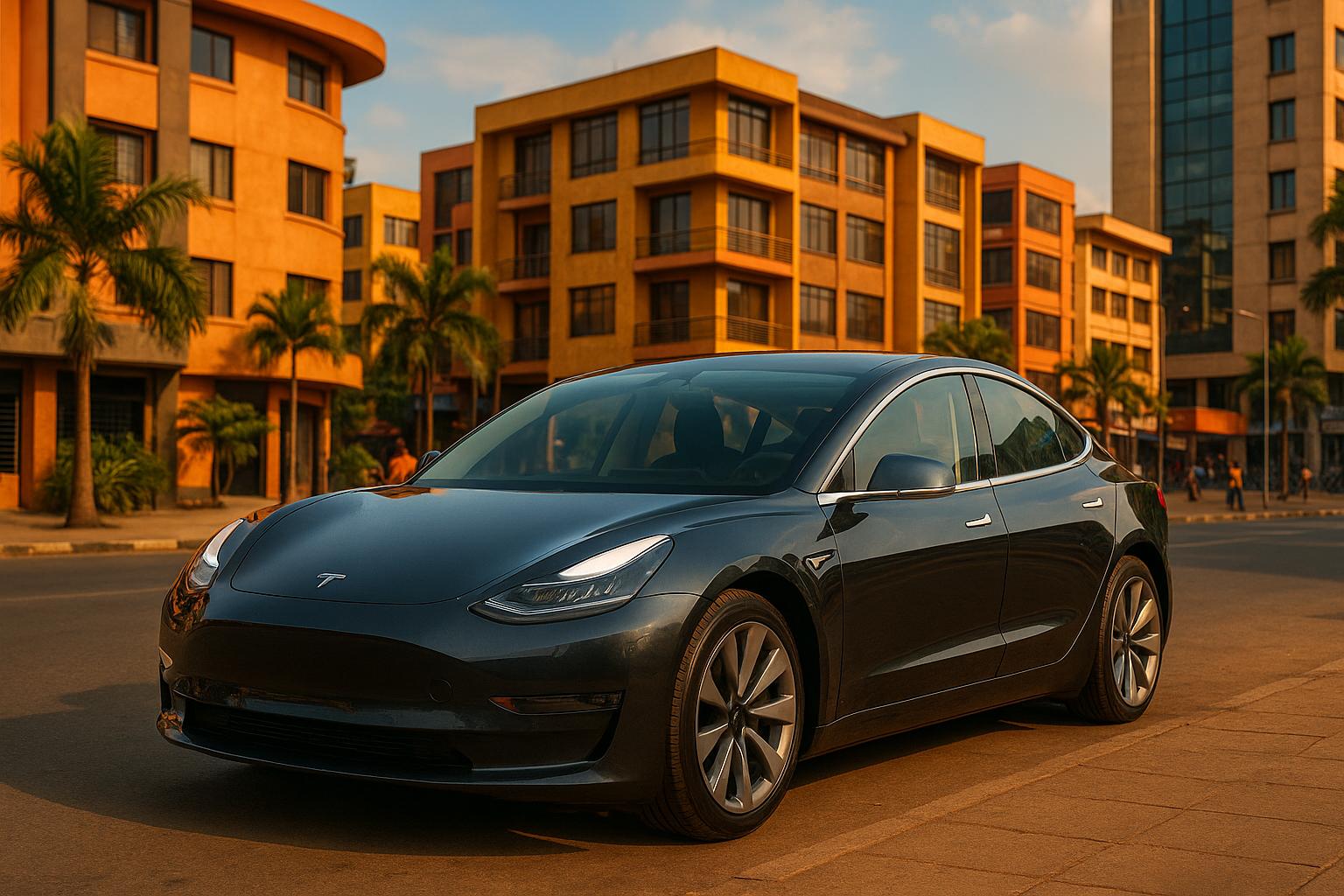
EV24.africa makes owning a Tesla in Africa simple by managing the entire import and delivery process. They handle everything from sourcing your preferred Tesla model to navigating customs, shipping, and local registration. African buyers can choose from Tesla‘s full lineup, including the Model 3, Model Y, Model S, and Model X, each offering impressive range and performance suited to different needs.
Key points to know:
- Models Available: Tesla Model 3 (compact sedan), Model Y (SUV), Model S (luxury sedan), and Model X (luxury SUV with falcon-wing doors).
- Challenges Addressed: EV24.africa simplifies importing, dealing with high import duties, and navigating limited charging infrastructure.
- Pricing: Expect final costs to be 50%-100% higher than Tesla’s MSRP due to shipping, duties, and taxes. For example, a Tesla Model Y in Rwanda was priced at $58,000 in 2024.
- Delivery Options: Choose between Roll-on/Roll-off (RoRo) for affordability or container shipping for added protection.
EV24.africa also offers financing options and post-delivery support, making Tesla ownership accessible across all 54 African countries. With their expertise, buyers avoid the complexities of importing and can focus on enjoying their new Tesla.
Tesla Models Available in Africa
Tesla Model Options
EV24.africa brings Tesla’s full range of vehicles to Africa, offering options that cater to everything from city commutes to long-distance road trips.
Tesla Model 3 is the most accessible option in Tesla’s lineup. This compact sedan offers 272 miles of range with its Standard Range Plus version, while the Long Range variant stretches that to 358 miles. With an acceleration of 0-60 mph in just 5.3 seconds (Standard Range), it’s an excellent fit for navigating urban areas. Inside, its minimalist design is centered on a 15-inch touchscreen that handles everything from climate control to navigation.
Tesla Model Y combines versatility with practicality. This compact SUV offers a 326-mile range (Long Range variant) and can seat up to seven passengers with an optional third row. With 66 cubic feet of cargo space, it’s ideal for families or businesses needing extra room. Its higher ground clearance compared to the Model 3 makes it better suited for the uneven roads often found in parts of Africa.
Tesla Model S stands out for its premium performance, boasting a 405-mile range in the Long Range version. It accelerates from 0-60 mph in an impressive 3.1 seconds and reaches a top speed of 149 mph. The interior features a 17-inch cinematic display and a 22-speaker audio system, making it a top choice for professionals and luxury enthusiasts who value both cutting-edge tech and high performance.
Tesla Model X is Tesla’s luxury SUV, offering 348 miles of range and its iconic falcon-wing doors that open vertically. With seating for up to seven and a towing capacity of 5,000 pounds, it’s perfect for those needing to haul equipment, trailers, or boats. Features like HEPA air filtration and Bioweapon Defense Mode add extra value, especially in areas with air quality challenges.
All Tesla models come equipped with Autopilot, over-the-air software updates, and access to Tesla’s Supercharger network. Their all-glass roofs and high-quality interiors enhance the driving experience, making these vehicles a strong match for a variety of needs across the continent.
While Tesla’s advanced features are appealing, understanding how they perform in Africa’s unique conditions is essential. This is where EV24.africa’s expertise becomes invaluable in helping buyers make informed decisions.
How Tesla Models Work in African Conditions
Tesla vehicles adapt impressively to Africa’s diverse climates and road conditions, though there are a few key factors buyers should consider.
Temperature performance is a critical aspect. Tesla’s thermal management system is designed to handle extreme heat, ensuring optimal battery performance even in places like Sudan or Chad, where temperatures can hit 120°F (49°C). The vehicles perform even better in moderate climates, such as those in Kenya or South Africa, with average temperatures between 60-85°F (15-29°C). While cold weather isn’t a major issue for most of Africa, drivers in mountainous areas or southern regions during winter may experience slight range reductions when temperatures drop below 32°F (0°C).
Road conditions across Africa vary widely, and Tesla models adapt differently to these challenges. The Model Y and Model X, with their higher ground clearance, are better suited for unpaved roads and potholes. Meanwhile, all Tesla models feature advanced suspension systems that ensure a smooth ride, even on rougher terrain. The low center of gravity from the floor-mounted batteries enhances stability on uneven surfaces.
Charging infrastructure is perhaps the most significant factor for Tesla owners in Africa. While countries like South Africa, Morocco, and Egypt have expanding networks of charging stations, many areas still lack sufficient coverage. Tesla vehicles come with an onboard charger that can be used with standard household outlets, though this results in longer charging times. The included Mobile Connector offers flexibility, allowing charging from different outlet types commonly found across the continent.
Tesla’s sealed battery packs and efficient thermal management systems protect performance in extreme heat and dusty environments. The vehicles’ low maintenance requirements – no oil changes, spark plugs, or transmission services – are an added advantage for African drivers.
Range considerations are especially important for long drives between cities. For instance, the Model S’s 405-mile range makes it feasible to travel from Cape Town to Port Elizabeth or Lagos to Abuja on a single charge. Shorter-range models, on the other hand, are ideal for city driving and shorter regional trips.
Tesla’s regenerative braking system is particularly useful in African urban centers like Cairo or Nairobi, where stop-and-go traffic is common. Additionally, the instant torque delivery makes highway merging and overtaking on two-lane roads smooth and efficient, enhancing the overall driving experience.
Tesla Prices in Africa and Global Comparisons
Tesla Pricing in Africa
The cost of owning a Tesla in Africa goes far beyond the manufacturer’s suggested retail price (MSRP). What buyers ultimately pay – referred to as the "landed cost" – includes a range of additional fees from the factory to the buyer’s doorstep in Africa. These extra expenses can push the final price 50%–100% higher than the MSRP.
It starts with Tesla’s standard MSRP, but factors like international shipping, insurance, and substantial import duties – sometimes exceeding 100% of the car’s value – quickly add up. On top of that, VAT or GST is applied to the cumulative cost, and registration fees include homologation, which ensures the vehicle meets local safety and emissions standards.
A good example of this pricing structure can be seen with the Tesla Model Y, introduced in Rwanda by AUTO24 in March 2024. The listed price was around $58,000, which accounted for all the import-related expenses. Clearly, a country’s tax and duty policies heavily influence Tesla’s affordability, leading to significant price differences across African markets.
Price Comparison: Africa vs US and Europe
When compared to prices in the United States and Europe, Tesla vehicles in Africa are noticeably more expensive. While buyers in the US and Europe often pay prices closer to the standard MSRP, African buyers face additional costs from international shipping, higher import duties, and local taxes. These factors combine to create a significant price premium for Tesla vehicles on the continent.
However, there are ways to offset these upfront costs. Over five years, a Tesla owner in Africa could save roughly $5,000 on fuel and maintenance compared to a traditional petrol sedan. Tesla’s global production scale also plays a role – 1.2 million Model Ys were delivered in 2023 alone – demonstrating manufacturing efficiencies that could eventually help bring prices down. Looking ahead, local assembly of electric vehicles in Africa has the potential to reduce final prices by 10–20% by cutting out expensive shipping and simplifying import procedures.
As interest in clean transportation grows across Africa and policies shift to support electric vehicles, the current price gap may narrow over time. While Tesla’s sticker price in Africa is steep, the long-term savings and evolving market dynamics make the investment increasingly appealing for buyers on the continent.
Tesla Model X Review – We drive the only one in South Africa!
How EV24.africa Handles Tesla Purchases
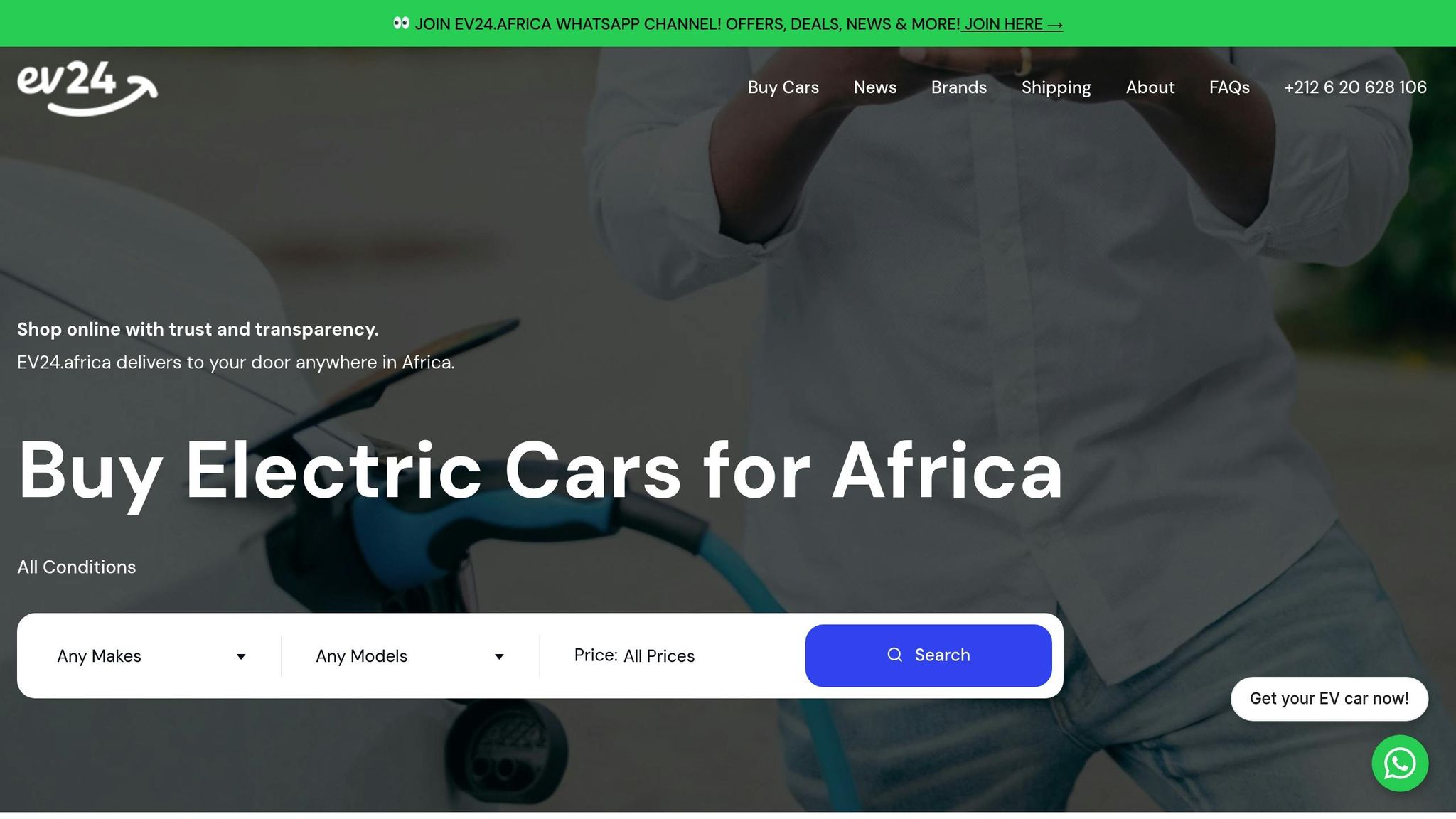
Buying a Tesla in Africa is easier than you might think, thanks to EV24.africa. They’ve streamlined the entire process, from placing your order to having your car delivered.
"For most people, the first step is figuring out how to get the car here in the first place. That’s where specialised services like EV24.africa come in, designed to turn what seems like a complicated import process into a clear, manageable journey."
EV24.africa focuses on making the experience simple and transparent. Instead of leaving buyers to figure out complex shipping regulations, customs procedures, and vehicle compliance standards, they handle all the heavy lifting behind the scenes.
Tesla Purchase Process Steps
The process of buying a Tesla through EV24.africa is broken down into clear, straightforward steps, ensuring everything runs smoothly.
It all starts with a pre-shipment inspection to confirm the vehicle’s condition, specifications, and battery health. Once the inspection is complete, EV24.africa provides a pro-forma invoice. This document outlines the car’s price with full transparency – no hidden fees – and also serves as critical paperwork if you need a loan to finance your purchase. They also take care of customs clearance, working with clearance agents to help you access any applicable tax exemptions.
Next comes choosing a shipping method. EV24.africa offers two main options: Roll-on/Roll-off (RoRo) or container shipping. RoRo is a budget-friendly choice where your Tesla is driven onto a ship and secured for transport. If you’re looking for added protection, container shipping encloses the car in a sealed steel container, which is ideal for high-value models. EV24.africa helps you decide based on your budget, the car’s value, and how much protection you’d like during transit.
To protect your investment, EV24.africa also recommends marine insurance. This coverage safeguards your Tesla against potential damage or loss during its ocean journey. Considering that shipping and logistics can add several thousand dollars – or even over $10,000 – to your Tesla’s total cost, marine insurance is a smart addition.
Payment Plans and Customer Support
Once shipping and customs are handled, EV24.africa ensures the financial side of things is just as stress-free by offering flexible payment options and ongoing support.
Understanding that buying a Tesla is a major financial decision, EV24.africa is working with local banks to create loan options tailored specifically for electric vehicle purchases. If you’re applying for financing, you’ll need to provide documents like proof of income, valid ID, recent bank statements (from the last three to six months), and the vehicle quotation from EV24.africa. The pro-forma invoice is a key part of this process, as banks rely on it to approve loans.
EV24.africa also helps customers explore green financing options. Some banks offer better interest rates or more flexible terms for eco-friendly purchases, recognizing the environmental advantages of electric vehicles like Teslas.
Once financing is approved, the final steps move quickly. You’ll sign the loan agreement, pay the required deposit, and then receive your Tesla’s keys along with ownership documents and registration paperwork. EV24.africa doesn’t stop there – they provide ongoing support even after delivery. Whether you have questions about your Tesla or need assistance, you can reach their team via email at [email protected] or through WhatsApp.
Their emphasis on clear pricing and flexible payment solutions ensures you can make well-informed decisions about your Tesla purchase. Plus, their continuous support means you’ll always have a reliable partner throughout your Tesla ownership journey in Africa.
sbb-itb-99e19e3
Delivery and Import Process
When you purchase a Tesla through EV24.africa, they take care of the entire delivery process, ensuring your car reaches you without hassle, no matter where you are in Africa. They’ve streamlined what could otherwise be a challenging international shipping experience into a smooth and straightforward operation.
Shipping and Delivery to Your Location
EV24.africa offers two main shipping options, tailored to fit different budgets and needs. Your choice between these methods will directly affect both your costs and delivery timeline.
Roll-on/Roll-off (RoRo) shipping is the more economical option. Your Tesla is driven directly onto a ship, secured for the journey, and driven off at the destination port. This method is ideal for operational vehicles and offers quicker transit times with frequent departures. It’s a no-frills option that gets the job done efficiently.
Container shipping, on the other hand, is all about maximum protection. Your Tesla is placed inside a sealed 20-foot or 40-foot container, shielding it from weather and handling damage. While this method is pricier, it’s perfect for high-value vehicles, non-operational cars, or when you want to include spare parts or accessories in the shipment. A 40-foot container can even fit up to 3-4 vehicles, making it a great choice if you’re importing multiple cars.
| Shipping Method | Cost | Transit Time | Protection Level | Best For |
|---|---|---|---|---|
| RoRo | Lower | Faster | Basic | Operational vehicles, budget-conscious buyers |
| Container | Higher | Slightly slower | Maximum | High-value models, non-operational vehicles, bulk accessories |
EV24.africa partners with top global logistics companies and customs agents to ensure your Tesla’s journey is smooth from start to finish. They also provide real-time tracking, so you’ll always know where your car is during transit.
Their logistics service goes beyond just shipping. EV24.africa handles all the technicalities of international trade, ensuring compliance with terms like CIF (Cost, Insurance & Freight) and DAP (Delivered at Place). This means they take care of the legal and regulatory aspects, making the process as stress-free as possible for you.
Once your Tesla is shipped securely, the focus shifts to clearing customs and completing registration.
Import Requirements and Customs
When your Tesla arrives at the destination port, EV24.africa steps in to handle the often overwhelming customs and import process. This is where many independent importers face challenges, but EV24.africa simplifies it by managing every detail.
They provide a full breakdown of costs upfront, ensuring no hidden fees or surprises. The "landed cost" of your Tesla includes everything – import duties, local taxes like VAT or GST, and registration and homologation fees.
To avoid delays or unexpected fees, EV24.africa takes care of all the necessary paperwork. Their team works directly with customs clearance agents to navigate the bureaucratic maze and even helps you access any available tax exemptions.
For those considering importing a car independently, the process can be daunting, with risks of delays, extra costs, and red tape. EV24.africa’s experienced import specialists eliminate these headaches, ensuring your Tesla clears customs quickly and efficiently.
They also handle vehicle registration as part of their service. Once your Tesla clears customs, EV24.africa coordinates with local authorities to complete the registration process. This includes preparing and submitting all necessary documents so you can legally drive your Tesla as soon as it’s delivered.
From shipping to final registration, EV24.africa ensures every step of the process is seamless. While they handle the complex logistics behind the scenes – working with international partners, port authorities, and government agencies – you can focus on getting ready to enjoy your new Tesla.
Owning a Tesla in Africa
Once your Tesla is delivered and registered, the real journey begins. Tesla vehicles are known for requiring much less maintenance compared to traditional gasoline cars. Forget about oil changes, spark plug replacements, or emission checks – they’re simply not needed with an electric vehicle like a Tesla. Even brake pad replacements are infrequent, thanks to Tesla’s regenerative braking system, which reduces wear on the brake components. This lower maintenance demand makes owning a Tesla more straightforward, offering a unique experience for drivers in Africa.
That said, there’s a significant challenge: Africa currently lacks official Tesla-certified service centers. While Tesla’s global service network spans North America, Europe, parts of the Middle East (including the UAE, Israel, and Saudi Arabia), and Asia/Pacific, the continent of Africa remains uncovered. For context, as of April 2025, there are 210 Tesla Service Centers in the United States alone. Tesla’s service model leans heavily on remote diagnostics, over-the-air software updates, and mobile technicians capable of performing repairs at your vehicle’s location. In Africa, however, Tesla owners must rely on independent repair shops. Keep in mind, though, that using non-Tesla service centers could impact your warranty. To mitigate risks, follow the owner’s manual carefully, maintain detailed service records, and prioritize preventive maintenance. For repairs that require Tesla-certified expertise, international solutions may be the only option, making proactive care all the more critical. While services like EV24.africa handle the complexities of importing and delivering Teslas, owners must navigate local service challenges by being resourceful and prepared.
Charging Your Tesla
Keeping your Tesla charged is another key part of ownership. Home charging is one of the most practical solutions for Tesla owners across Africa. Installing a Tesla Wall Connector or simply plugging into a standard outlet overnight is often enough to ensure your car is ready for the following day. However, with Tesla’s Supercharger network still underdeveloped on the continent, longer trips require careful planning to account for available charging points. In urban areas, public charging stations are slowly becoming more common, but many owners also turn to portable chargers and backup systems to ensure reliable access to power.
Local Factors for Tesla Owners
Driving a Tesla in Africa comes with its own set of considerations. High temperatures in some regions can affect battery efficiency, requiring extra attention to charging habits. Roads vary widely across the continent – from smooth highways in major cities to unpaved, rugged terrain in rural areas – impacting ride quality and vehicle handling. Dusty environments can also pose challenges, making regular cleaning essential to keep sensors and filters functioning properly. Additionally, sourcing replacement parts often involves international shipping, which can extend repair times and increase costs. These factors highlight the importance of thoughtful planning and adaptability for Tesla owners in Africa.
Why Choose EV24.africa for Your Tesla Purchase
Bringing a Tesla to Africa has never been easier, thanks to EV24.africa. They handle the complicated parts – customs codes, homologation, and shipping logistics – so you don’t have to worry about navigating the red tape on your own. This means you can skip the headaches and focus on enjoying your new car.
From the moment you decide to purchase a Tesla to the final step of local registration, EV24.africa has you covered. Their end-to-end service ensures you won’t hit any roadblocks, like figuring out customs clearance or local vehicle registration. It’s a seamless process designed to save you time and stress.
Clear and transparent pricing is another standout feature. They provide detailed quotes that outline your Tesla’s full landed cost, which can range from 50% to 100% above the MSRP due to shipping, duties, and taxes. This upfront clarity eliminates the risk of unexpected expenses – a common pitfall for those importing vehicles independently.
For example, in March 2024, their sister company AUTO24 successfully imported the Tesla Model Y to Rwanda. The vehicle was listed at approximately $58,000, with all import-related costs included. This example highlights their commitment to offering pricing that accounts for every fee upfront, so there are no surprises.
EV24.africa’s reach is impressive, covering all 54 African countries – from Algeria to Zimbabwe. Whether you need port-to-port or door-to-door delivery, they offer flexible shipping options like RoRo (Roll-on/Roll-off) and container shipping, tailored to your specific needs.
To make Tesla ownership more accessible, flexible payment options are available. Whether you need financing assistance or prefer different payment methods, EV24.africa works to accommodate your financial situation, making it easier to bring a Tesla home.
With the backing of AUTO24.africa and Africar Group Pty Ltd., EV24.africa operates with the expertise and stability required to navigate Africa’s diverse regulatory landscapes. This foundation ensures they can manage the complexities of importing Teslas into various markets across the continent.
Finally, they don’t just leave you to figure things out once the car arrives. EV24.africa offers ongoing support through WhatsApp and other channels, guiding you every step of the way. This hands-on assistance is especially valuable in regions where local service options for Teslas might be limited, ensuring you can focus on enjoying your new car instead of stressing over logistics.
FAQs
What should I know about charging a Tesla in Africa with the current infrastructure?
Charging a Tesla in Africa takes a bit of forethought because public charging stations are scarce in most countries. At the moment, Morocco stands out as the only African country with Tesla Supercharger stations, offering a modest but growing network. Elsewhere on the continent, private chargers or solar-powered setups are often the go-to solutions for Tesla owners.
If you’re thinking about getting a Tesla in Africa, installing a home charger is a smart move. Solar-powered chargers can also be a practical choice, especially in regions with plenty of sunlight. Keep an eye on local infrastructure updates, as Tesla continues to expand its footprint and energy solutions across Africa.
How does EV24.africa simplify the customs and import process for Tesla deliveries in Africa?
EV24.africa simplifies the entire customs and import process, ensuring your Tesla delivery is smooth and stress-free. They handle all the essential paperwork, from purchase invoices and export certificates to customs clearance documents. On top of that, they manage taxes, registration, and any required inspections, so you don’t have to worry about a thing.
For added convenience, they offer Delivered Duty Paid (DDP), giving you upfront, transparent pricing without hidden fees. Their logistics team takes care of shipping – whether you choose RoRo or container – and handles local registration. Plus, their dedicated customer support team is there to guide you every step of the way, making sure the process stays hassle-free from start to finish.
What financing options are available through EV24.africa to help make owning a Tesla in Africa easier?
EV24.africa offers a range of financing options designed to make owning a Tesla more attainable throughout Africa. These include bank loans and leasing agreements, which are facilitated through reliable local financial institutions.
To cater to different customer needs, they also support multiple payment methods like mobile money and bank transfers, ensuring a hassle-free and convenient experience for buyers across various regions.


